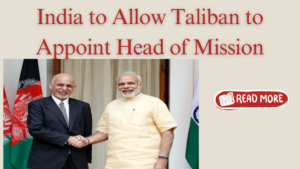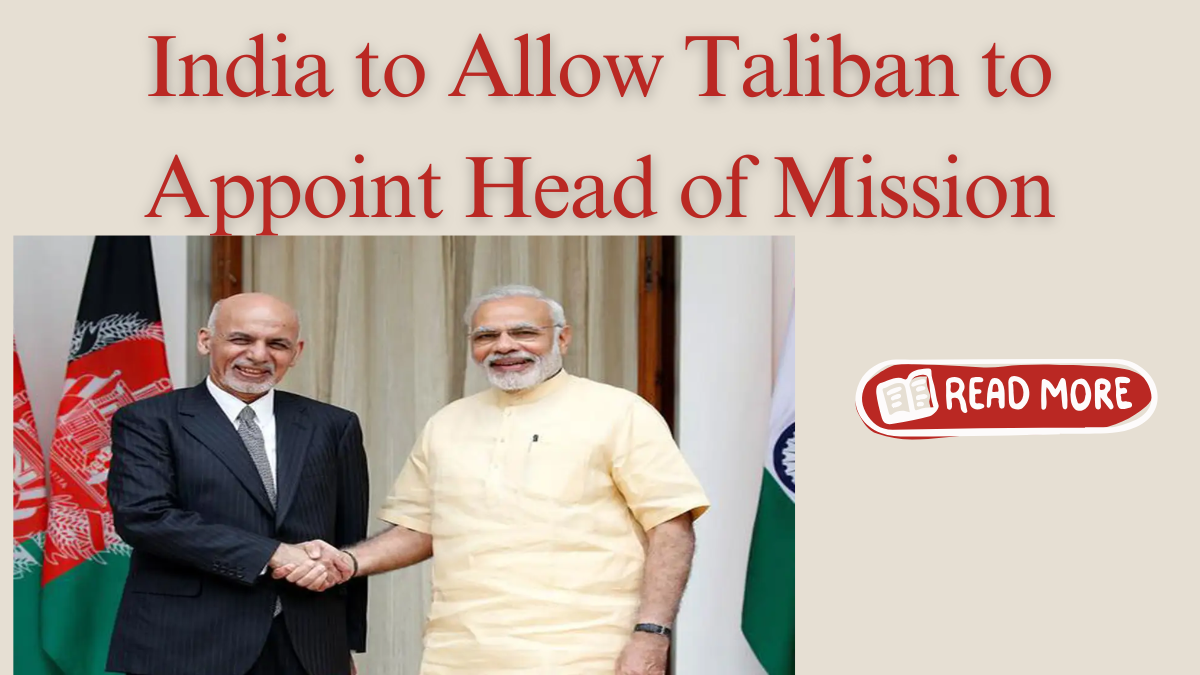India’s foreign policy has been under global scrutiny, especially regarding its handling of the Taliban’s growing influence in Afghanistan. In a significant move, the Modi government is reportedly considering allowing the Taliban to appoint a head of the Afghanistan Embassy in India, without granting them official diplomatic status. This decision, while controversial, reflects India’s complex diplomatic calculus in the aftermath of the Taliban’s return to power in Afghanistan.

Background: India’s Response to Taliban’s Rise
Since the Taliban’s rapid takeover of Afghanistan in August 2021, India has faced a diplomatic dilemma. While India was one of the countries that initially refused to recognize the Taliban regime, the growing global focus on Afghanistan’s stability and the Taliban’s influence has forced India to reassess its approach. Despite not officially recognizing the Taliban as Afghanistan’s legitimate government, India has kept its embassy in Kabul open, though its consular operations have been suspended for the time being.
However, this shift in policy regarding the Afghanistan Embassy in New Delhi marks a significant turning point in India’s handling of the Taliban’s presence on the global stage.
Key Points About the Taliban Appointment
India is likely to permit the Taliban to appoint a head of mission to the Afghanistan Embassy in New Delhi, but with a notable distinction: the appointee will not enjoy full diplomatic status. This means that while the Taliban will maintain a presence at the embassy as a practical necessity for Afghanistan’s interests in India, the official recognition that would allow the ambassador to engage in diplomatic functions will be withheld.
The Afghanistan Embassy would continue to officially remain the diplomatic mission of the erstwhile ‘Islamic Republic of Afghanistan’, the government overthrown by the Taliban in August 2021. The Taliban, however, will be treated as a non-diplomatic entity with an appointee who may be able to conduct some embassy-related tasks, but without the privileges that would come with a full ambassadorial role.
Why This Decision Matters
The key question is why India is taking this approach when most other countries have been wary of engaging diplomatically with the Taliban. Several factors may be at play:
- Geopolitical Considerations: With Afghanistan being a neighbor of India’s, maintaining some form of interaction with the Taliban-controlled country may be seen as a way for India to ensure its strategic and security interests are protected, especially given the Taliban’s influence in South Asia.
- Humanitarian and Development Efforts: Despite its reluctance to officially recognize the Taliban, India has been providing humanitarian assistance to Afghanistan, including food aid, medicines, and vaccines. By allowing the Taliban to appoint a head, India could be signaling a pragmatic engagement, focused on Afghanistan’s stability and ensuring the well-being of its citizens.
- Diplomatic Engagement: The decision could be seen as an effort to engage diplomatically with Afghanistan in the face of an evolving situation. With Pakistan, China, and other countries engaging with the Taliban, India might have decided to maintain communication channels rather than shut itself off entirely.
- Avoiding Diplomatic Isolation: India might be positioning itself to avoid being isolated diplomatically in the region. Other global powers, including Russia, have started engaging with the Taliban government, which might have influenced India to reassess its stance.
What This Means for India’s Foreign Policy
India has long maintained a policy of non-recognition of the Taliban due to its concerns over the group’s human rights abuses, especially its treatment of women and minorities. India has also been cautious about its historical relations with Afghanistan, particularly its ties with the previous government and its involvement in infrastructure and developmental projects.
By allowing the Taliban to appoint a head of mission while withholding full diplomatic recognition, India is threading a fine line between engagement and non-recognition. The move could be an attempt to show that India is willing to interact with Afghanistan’s new reality, without directly endorsing the Taliban’s legitimacy. In essence, it is a pragmatic approach, balancing diplomatic considerations with India’s broader interests in the region.
The Global Reaction
This development could have significant implications not just for India but also for international relations concerning the Taliban regime. Countries like the US, EU members, and others have been slow to engage with the Taliban diplomatically, citing concerns over the group’s actions since taking control of Afghanistan.
India’s decision could further isolate the Taliban on the world stage, with the Taliban’s diplomatic status being a grey area. On the other hand, some analysts suggest that India’s approach could encourage other countries to adopt a similar stance, neither fully recognizing the Taliban nor completely distancing themselves from the need for engagement with Afghanistan.
Moving Forward: Will This Set a Precedent?
If India allows the Taliban to appoint a head of mission, it might set a precedent for other countries to follow. While India’s approach is careful not to offer full recognition, it underscores the growing reality that Afghanistan’s new government will need to be engaged on some level. How this plays out will be a key indicator of how global powers adjust to the Taliban’s rule and how they balance engagement with accountability for human rights violations.
Key Takeaways
- India may allow the Taliban to appoint a head of the Afghanistan Embassy in New Delhi, but the appointee will not have full diplomatic status.
- The Taliban would still not be recognized as the legitimate government of Afghanistan by India.
- Pakistan and China have been more willing to engage with the Taliban, which may have influenced India’s decision to allow this move.
- India’s decision could set a precedent for how other countries engage with Afghanistan’s Taliban-led government.
Conclusion
The Modi government’s likely decision to allow the Taliban to appoint a head of mission to its embassy in New Delhi without full diplomatic recognition is a strategic shift in India’s foreign policy. It reflects India’s attempt to engage diplomatically with Afghanistan, even as it refrains from legitimizing the Taliban’s rule. As the Taliban continues to assert its power in Afghanistan, the international community will need to navigate the complex dynamics of engaging with a government accused of severe human rights abuses. India’s cautious approach may serve as a model for others to follow, or it could set the stage for a broader shift in how the world deals with the Taliban.
People May Ask
Why is India allowing the Taliban to appoint a head of mission?
India may be taking a pragmatic approach to maintain diplomatic channels with Afghanistan, balancing strategic interests and humanitarian concerns, while still withholding full recognition of the Taliban.
Will the head of mission have full diplomatic status?
No, the Taliban’s appointee will not enjoy full diplomatic status, meaning they will not have the same privileges and responsibilities as a traditional ambassador.
How does this decision impact India’s relations with the Taliban?
While India’s move allows engagement with Afghanistan, it does not equate to recognizing the Taliban as the legitimate government, signaling a careful and nuanced approach.
What are the implications for Afghanistan’s future relations with the world?
India’s decision may inspire other countries to engage with Afghanistan in a similar manner, creating a gray area where engagement happens without full diplomatic recognition.
Will this decision change India’s stance on the Taliban?
India is unlikely to fully recognize the Taliban in the near future, but this decision shows flexibility in interacting with the reality of Afghanistan’s situation under the Taliban’s rule.
Pari is a passionate writer known for captivating stories that blend imagination and reality. Inspired by travel, history, and everyday moments, Pari crafts narratives that resonate deeply with readers.
